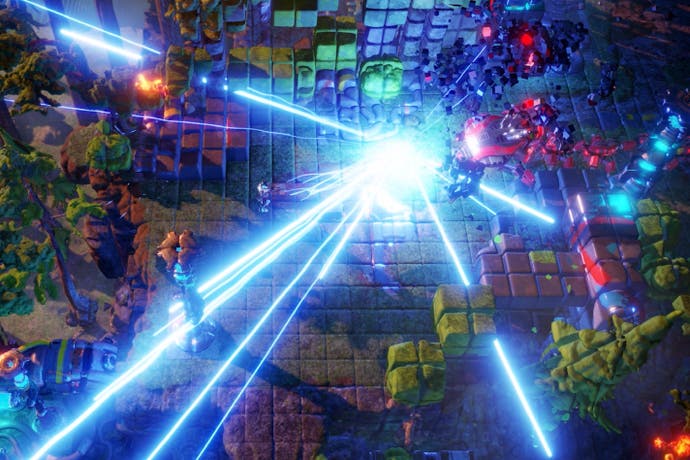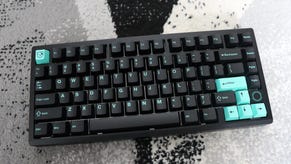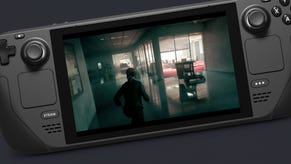Arcade is dead, but Housemarque kept it alive for three brilliant games
Continue?
In the early weeks of its life, the PS3 was Super Stardust HD. That's how I remember it anyway. And when the PS4 came around, it turned out that the PS4 was Resogun. The news today that low sales have forced Housemarque, who made both these games, to declare that 'Arcade is dead' lends all of these memories a bittersweet tinge. And yet - and I mean this as the highest compliment I can come up with - it's hard to have too many emotions around games like Super Stardust and Resogun, other than panic and excitement - extreme, panoramic excitement. Bittersweet melancholy doesn't stick about for long.
Housemarque has made a lot of great games over the years, but when I think of the developer, I tend to think of a holy trinity: Stardust, Resogun and this year's Nex Machina. All three have Eugene Jarvis in common - the first two are creative reinventions of Jarvis's greatest arcade achievements, Robotron and Defender, while the man himself turned up to help with Nex Machina - but they also have other things that draw them together in my head. Precision controls? Check. A focus on points? Double-check. Most of all, though, they're all about spectacle. These games are just beautiful to behold, glittering with busy light, erupting in tidal roars of voxels, scattering sparks and flames and laser beams in every direction. When you look at a Housemarque game you can't look away.
Much of this beauty is funneled through the mechanics. It's impossible to daydream about Stardust glory without dreaming about perfect control over those weapons that sway back and forth as you race over the globe of each level, flailing death around like a whip, like a leash. It's impossible to think of the sheer style of Resogun without remembering the way that clear robotic voice speaks to you through the controller, reminding you of the three or four different things that are constantly fighting for your attention in a game that is not so much about finding a life amongst tightly choreographed death as it is about juggling priorities as you do so. Beyond all that, though, there is a layer of graphical majesty which initially seems to be simply, joyously gratuitous - beauty for the sake of beauty.
But it's not gratuitous. It serves as a vital reminder, in fact, that arcade games are not meant to be delicate things. They are meant to be lavish and gorgeous and tastelessly colourful if need be. They are meant to be exuberant. They are meant to attract an audience, because they were born in the dark, in the sweaty, smoky, sticky dark of dive bars and pool halls, and they had to compete for your love, your obsession, your wild rage from the moment they were first plugged in.
Today I wonder if I forget this point too easily, just as I forget that the word 'arcade' does not just suggest a type of game - fast turnover between life and death, simple to grasp and hard to etc, etc. Arcade is also a business model - a pay-to-play model that absolutely demanded all that glitz in the first place. There is a story Sam Dicker, who worked on the audio for Defender, once told me about seeing that game in the wild and understanding suddenly how special it was. The moment that convinced him was the moment he spotted people putting in quarters not to play the game but to enjoy the game's death explosion.
When arcade thinking returned to the forefront of video games - it is hard for me not to link this with Housemarque's output on the PS3, with Geometry Wars fizzing away on XBLA - the type-of-game element made a comeback, but the business model did not. (It has moved elsewhere with great success, mind.) That's good for me, but probably less good for Housemarque, I think, who had to deal with the marketplace's sometimes strange ideas about what constitutes value in a video game. Housemarque, you made incredible arcade games - absolutely incredible arcade games. And I would probably have paid you more than I would like to admit just for the joy of expiring in a flaming burst of voxels. I can't wait to see what the studio turns its hand to next.







.jpg?width=291&height=164&fit=crop&quality=80&format=jpg&auto=webp)
_Rwmp6uD.jpg?width=291&height=164&fit=crop&quality=80&format=jpg&auto=webp)

